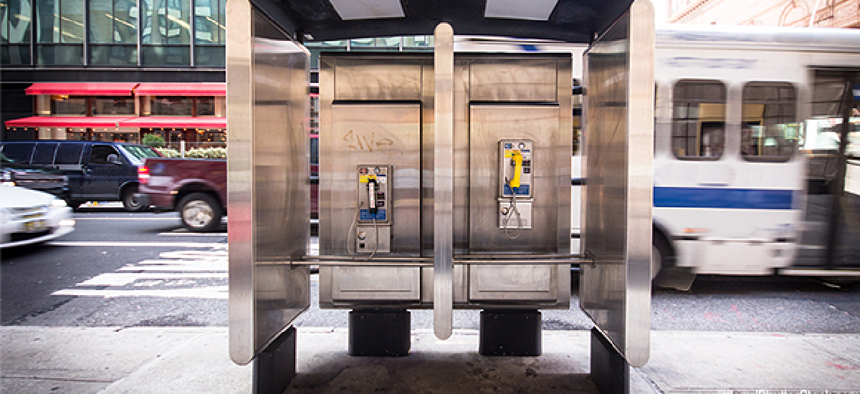NYC replacing payphones with Wi-Fi hotspots


Connecting state and local government leaders
Wi-Fi network connection points will be installed in NYC public payphone kiosks, replacing the aging devices. The hotspots will also still include an option for voice services and offer free calling to 911 and 311.
Nearly half a year after announcing it was building the nation’s largest public Wi-Fi network in Harlem, the New York City Department of Information Technology and Telecommunications, released a request for proposals for building such a network across all five boroughs.
In the May 1 announcement, the city stated network connection points will be installed in public payphone kiosks, replacing the payphones. The hotspots will also still include an option for voice services and offer free calling to 911 and 311.
“For years, the question was, ‘What to do with payphones?’ and now we have an answer,” said Mayor Bill de Blasio.
“The digital age holds great potential to better deliver services, and by reimagining 20th century payphones as 21st century connection points, we’re making broadband access more equitable and accessible to every New Yorker,” said, Maya Wiley, counsel to the mayor.
Using a franchise model, the city said it expected to net revenues of at least $17.5 million with a network of over 7,000 hotspots. Potential franchisees include big wireless companies like AT&T or Verizon Wireless, which would make money through existing billboards and digital advertising, according to a report in Time magazine. Franchise owners would be expected to install, maintain and operate the structures.
Franchise owners will also be able to earn money by charging for voice phone calls (except 911 and 311) and cellphone re-charging. In addition to cellphone chargers, they can also install solar panels to offset costs and incorporate other complementary telecommunications services. In exchange, NYC would receive a percentage of gross revenues or a guaranteed minimum amount.
Under the contract the Wi-Fi service must be provided 24/7 with a signal strong enough to reach a minimum of 85 feet across a busy street, and the hotspots should work together as a network.
The city plans to sign a service contract, which will run until June 24, 2026, by the end of 2014. The city’s 10 existing payphone franchises expire Oct. 15 of this year, reported Kiosk Marketplace.
The concept of free hotspots in NYC is not new. In 2012 the city began a pilot program of Wi-Fi through payphones, http://gcn.com/articles/2012/07/12/agg-nyc-adds-free-wifi-to-pay-phones.aspx, and last year it organized a Reinvent Payphones design challenge. NYC parks have hotspots, and others can be found on openwifinyc, which includes hotspots in cafes and restaurants, and NYCgo, a visitor’s guide to the city.
NYC’s payphone-to-hotspot project may jumpstart the city’s project with City24/7, Cisco and LG Electronics to install more than 250 smart screens in payphone kiosks across the five boroughs. The interactive platform incorporates touch, voice and audio-technology, and provides information from open government programs, local businesses and citizens via connected sensors, monitors and intelligent data tools.
In addition to bringing revenue to the city, NYC expects the Wi-Fi hotspots will help support job seekers, freelancers, residents in need of affordable broadband services, small businesses, the local tech industry and visitors.
“Internet access needs to be more readily available to the public, and reinventing payphones to include free Wi-Fi is a terrific way to do that. Due to the widespread use of cellphones, payphones, as they currently exist, no longer provide significant assistance to New Yorkers. However, by modernizing this infrastructure and utilizing the latest technological advancements, we could provide vital services to hundreds of thousands of residents,” said council member James Vacca, chair of the committee on technology, in a release.
Not many days after the Wi-Fi announcement, de Blasio announced the appointment of Anne Roest as commissioner of DoITT, replacing acting commissioner Evan Hines. Among her other projects, Roest will be responsible for the free Wi-Fi network build.
Responses to the RFP are due by June 30.




